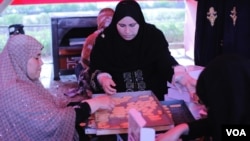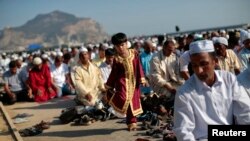CAIRO —
Protesters in Cairo's sit-in camps are celebrating Eid al-Fitr, the holiday that marks the end of the holy month of Ramadan. Living in tents, however, makes some traditions hard to observe. To solve one holiday dilemma, protesters have set up stoves outside their camp to ensure no demonstrator will be without cookies this holiday season.
At protests, regardless of the political leaning of the demonstrators, small actions - like cooking or cutting hair - can become acts of defiance.
Inside a tent just outside of the Rabaa protest camp, three stoves have been operating around the clock for three days. About a dozen women and children fill boxes with two kinds of cookies: one they call “biscuits” and another called “kak.”
As they empty trays into cardboard boxes, some of the ladies sing “Hey, cookies! Morsi is coming after Eid.” At rallies, protest organizers from the Muslim Brotherhood have told crowds that by the end of the holiday, ousted President Mohamed Morsi will be released from detention and with them in Rabaa to lead the prayers.
The next Egyptian leader who will be thrown out of office by public protest, they add, is Army Chief Abdel Fatah el-Sissi, the man who orchestrated Morsi's ouster on July 3. The Egyptian public is now profoundly divided between those who support Morsi, and those who support Sissi.
After she finished singing, Hoda Mohammad Ali said cookies had been distributed to every tent in Rabaa, where thousands of people have been demonstrating for months in favor of Morsi.
The military led-interim government repeatedly has ordered protesters to go home or face arrests, but the demonstrators have not budged.
If authorities decide to dismantle this camp and another across town, diplomats and rights organizations say there will be violence.
Ali said because of the threat of violence, the stoves are set up outside the camp. If someone shoots one of the gas cylinders that power the stoves it would cause an explosion. Not far from where the stoves are now, scores of people were killed two weeks ago in clashes between the police and protesters. Since then, barricades made of sidewalk bricks and sandbags have increased in size and number every day.
Inside the tent, cookie-makers say they are not bothered by their proximity to the front line, and it is clear that the culture of martyrdom is as powerful among the women and children in Rabaa as it is among the dozens of men guarding the entrance to the camp with sticks and hardhats.
Warda Abdulrahman is the mother of four. Like many of the women and children, she said she would be proud to die for what she feels is not only a fight for democracy, but a fight for Islam itself. Democracy, she added, cannot be secular.
Iman, 14, said she is staying at the protest with her parents and her brother and sister. They came to share the happiness of the holiday and support Morsi. When asked if she feared that the camp could turn dangerous she said, “I will donate my blood for my country. I came here to be a martyr. That's all.”
She and some other children put sprinkles on cookie dough on a tray shaped to read, “Get out Sissi! Morsi is my President,” which rhymes in Arabic.
As we leave the tent, the ladies also point to a box of broken and burned cookies on the ground and ask us to send them to U.S. President Barack Obama to protest what they see as the United States' failure to call Morsi’s removal a “military coup.”
American foreign policy towards Egypt has drawn criticism from all sides here in Cairo. U.S. intentions remain unclear, with State Department officials saying, “We have determined that we don’t need to make a determination."
At protests, regardless of the political leaning of the demonstrators, small actions - like cooking or cutting hair - can become acts of defiance.
Inside a tent just outside of the Rabaa protest camp, three stoves have been operating around the clock for three days. About a dozen women and children fill boxes with two kinds of cookies: one they call “biscuits” and another called “kak.”
As they empty trays into cardboard boxes, some of the ladies sing “Hey, cookies! Morsi is coming after Eid.” At rallies, protest organizers from the Muslim Brotherhood have told crowds that by the end of the holiday, ousted President Mohamed Morsi will be released from detention and with them in Rabaa to lead the prayers.
The next Egyptian leader who will be thrown out of office by public protest, they add, is Army Chief Abdel Fatah el-Sissi, the man who orchestrated Morsi's ouster on July 3. The Egyptian public is now profoundly divided between those who support Morsi, and those who support Sissi.
After she finished singing, Hoda Mohammad Ali said cookies had been distributed to every tent in Rabaa, where thousands of people have been demonstrating for months in favor of Morsi.
The military led-interim government repeatedly has ordered protesters to go home or face arrests, but the demonstrators have not budged.
If authorities decide to dismantle this camp and another across town, diplomats and rights organizations say there will be violence.
Ali said because of the threat of violence, the stoves are set up outside the camp. If someone shoots one of the gas cylinders that power the stoves it would cause an explosion. Not far from where the stoves are now, scores of people were killed two weeks ago in clashes between the police and protesters. Since then, barricades made of sidewalk bricks and sandbags have increased in size and number every day.
Inside the tent, cookie-makers say they are not bothered by their proximity to the front line, and it is clear that the culture of martyrdom is as powerful among the women and children in Rabaa as it is among the dozens of men guarding the entrance to the camp with sticks and hardhats.
Warda Abdulrahman is the mother of four. Like many of the women and children, she said she would be proud to die for what she feels is not only a fight for democracy, but a fight for Islam itself. Democracy, she added, cannot be secular.
Iman, 14, said she is staying at the protest with her parents and her brother and sister. They came to share the happiness of the holiday and support Morsi. When asked if she feared that the camp could turn dangerous she said, “I will donate my blood for my country. I came here to be a martyr. That's all.”
She and some other children put sprinkles on cookie dough on a tray shaped to read, “Get out Sissi! Morsi is my President,” which rhymes in Arabic.
As we leave the tent, the ladies also point to a box of broken and burned cookies on the ground and ask us to send them to U.S. President Barack Obama to protest what they see as the United States' failure to call Morsi’s removal a “military coup.”
American foreign policy towards Egypt has drawn criticism from all sides here in Cairo. U.S. intentions remain unclear, with State Department officials saying, “We have determined that we don’t need to make a determination."







